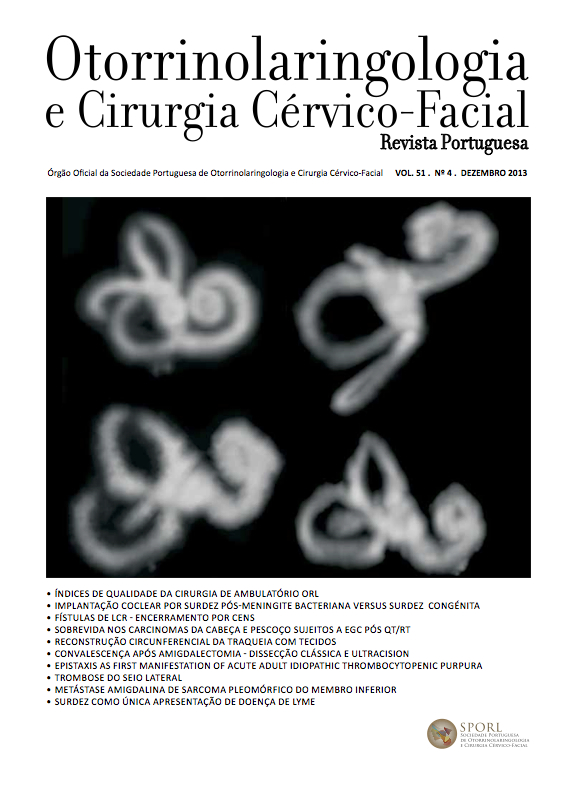Cochlear implantation after bacterial meningitis vs congenital deafness - Comparison of performances
DOI:
https://doi.org/10.34631/sporl.45Keywords:
meningitis, cochlear implant, deafnessAbstract
Introduction: Bacterial meningitis is a known cause of acquired deafness. This may show in different degrees and have inevitable consequences, if not rehabilitated in time. In the rehabilitation of profound deafness, the cochlear implant (CI) has recognized efficacy, but better or worse performances are possible. Some authors suggest that implanted children after bacterial meningitis have less favorable results than those implanted for other causes, including congenital deafness.
Objective: To evaluate the results of the audio - oral performance with CI of children with profound deafness after bacterial meningitis and compare them with the performances of children with congenital profound deafness.
Methods: A retrospective study based upon the population of profound deaf children admitted in the hearing rehabilitation program with CI in Centro Hospitalar de Coimbra E.P.E., between 1993 and 2010. Case revision of children implanted with profound deafness after bacterial meningitis (24 cases) and comparison of results of CI performance (hearing, speech and voice) in deafness by meningitis (in pre- and peri-lingual age) and congenital deafness.
Results: The test results of the audio-oral skills for hearing, speech and voice were similar in both groups of implantation after meningitis and in congenital deafness (p value greater than 0.05 in all tests except the SIR test p = 0.004).
Conclusion: There were no statistically significant differences in tests of audio-oral skills with CI between the 2 studied groups; the performance with CI was similar.
Downloads
References
Anjos LP, Queirós F, Pereira MC, Brandão M et. al, Prognóstico audiológico tardio relacionado à meningite em lactentes, Arq
Neuropsiquiatr 2004 Sep;62(3-A):635-40
Du Y, Wu X, Li L, Mechanisms of bacterial meningitis-related deafness, Drug Discovery Today: Disease Mechanisms/Hearing
Disorders. 2006 Spring;3(1):115-8
Wellman MB, Sommer DD, McKenna J, Sensorioneural Hearing Loss in Postmeningitic Children, Otol Neurotol. 2003 Nov; 24(6):907-12
Kutz JW, Simon LM, Chennupati SK, Giannoni CM et. al., Clinical Predictors for Hearing Loss in Children With Bacterial Meningitis, Arch
Otolaryngol Head Neck Surg. 2006 Sep;132(9):941-5
Merkus P, Free RH, Mylanus EAM, Stokroos R et. al., Dutch Cochlear Implant Group (CI-ON): Consensus Protocol on Postmeningitis Hearing
- Evaluation and Treatment, Otol Neurotol. 2010 Oct;31(8):1281-6
Reeck JB, Lalwani AK, Isolated Vestibular Ossification after Meningitis Associated with Sensorioneural Hearing Loss, Otol Neurotol. 2003
Jul;24(4):576-81
Richardson MP, Reid A, Tarlow MJ, Rudd PT, Hearing loss during bacterial meningitis, Arch Dis Child. 1997 Feb;76(2):134-8
Bevilacqua MC, Moret ALM, Costa Filho OA, Nascimento LT et. Al., Implantes cocleares em crianças portadoras de deficiência auditiva decorrente de meningite, Rev Bras Otorrinolaringol. 2003 Nov;69(6):760-4
Mattiola LR, Makowiecky M, de Salles CEG, Cardoso MP et. Al., Labirintite Ossificante. Relato de um caso e Revisão da Literatura, Arq.
Int. Otolaringol. 2008 Abr;12(2):300-2
Durisin N, Arnoldner C, Stover T, Lenarz T et. al., Audiological performance in cochlear implanted patients deafened by meningitis
depending on duration of deafness, Eur Arch Otolaryngol. 2008 Apr;265(4):381-8
Mitchell TE, Psarros C, Pegg P, Rennie M et. al., Performance after cochlear implantation: a comparison of children deafened by meningitis and congenitally deaf children, J Laryngol Otol. 2000 Jan;114(1):33-7
Richardson MP, Williamson TJ, Reid A, Tarlow MJ, et. al., Otoacoustic emissions as a screening test for hearing impairment in
children recovering from acute bacterial meningitis, Pediatrics. 1998 Dec; 102(6): 1364-8






